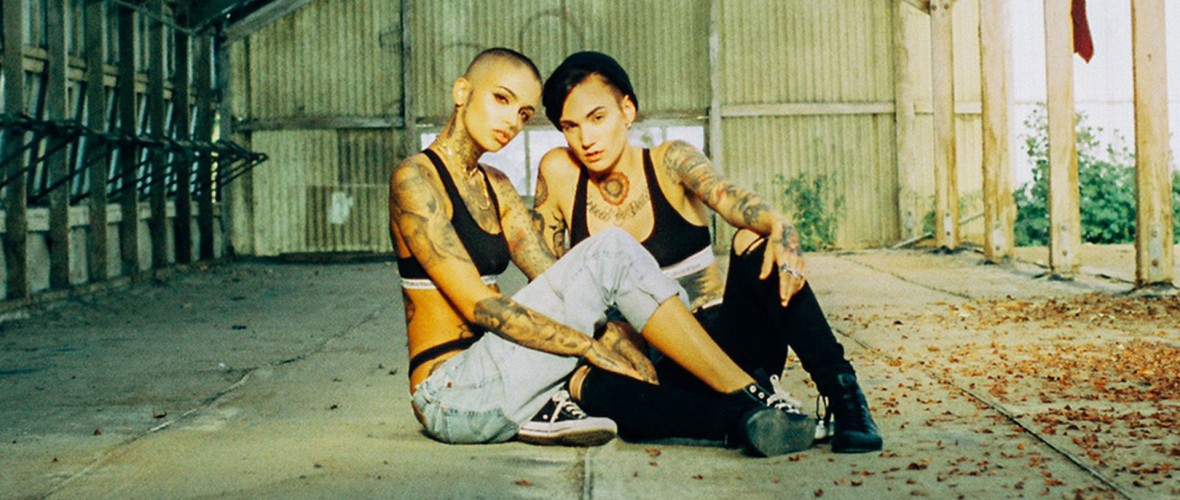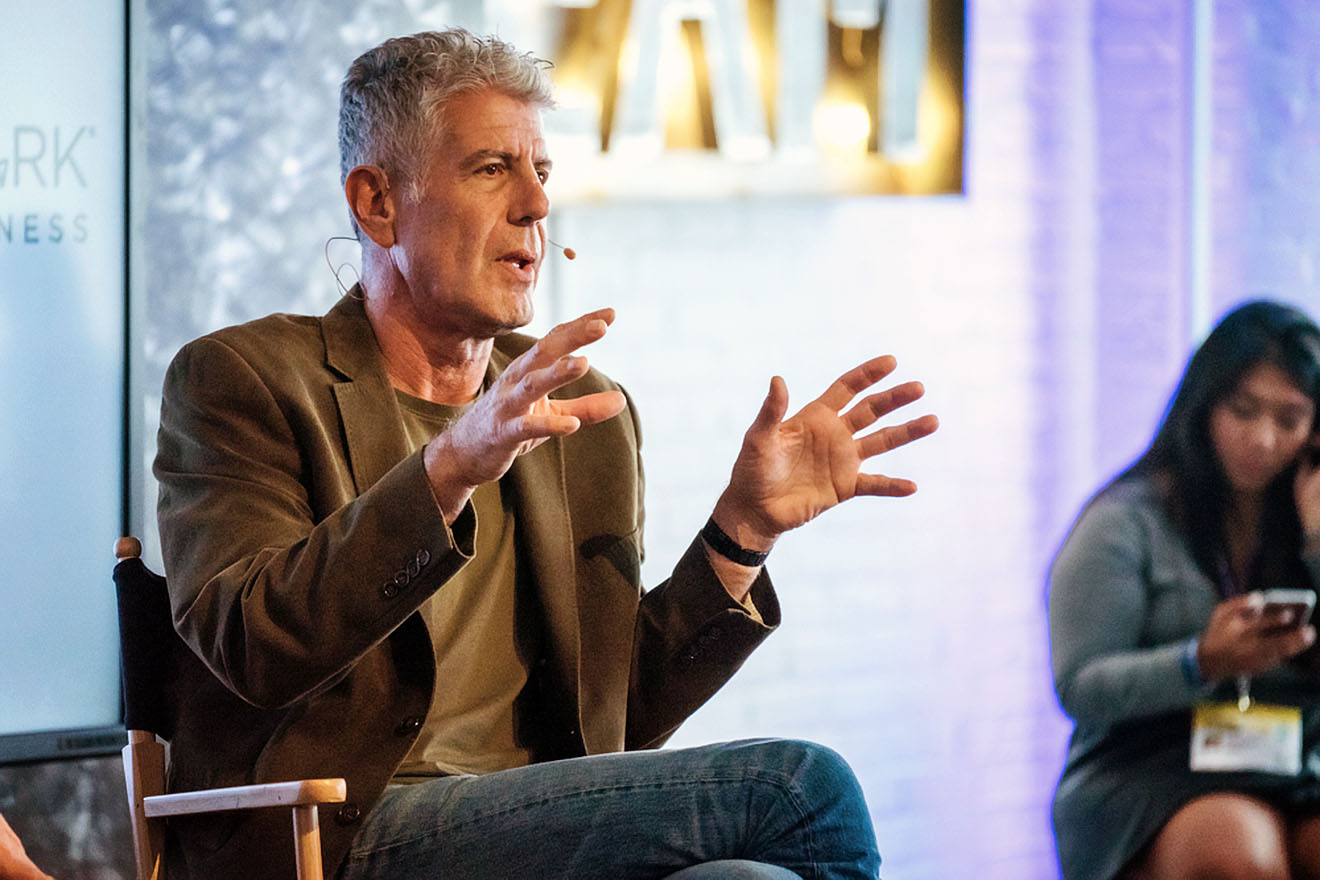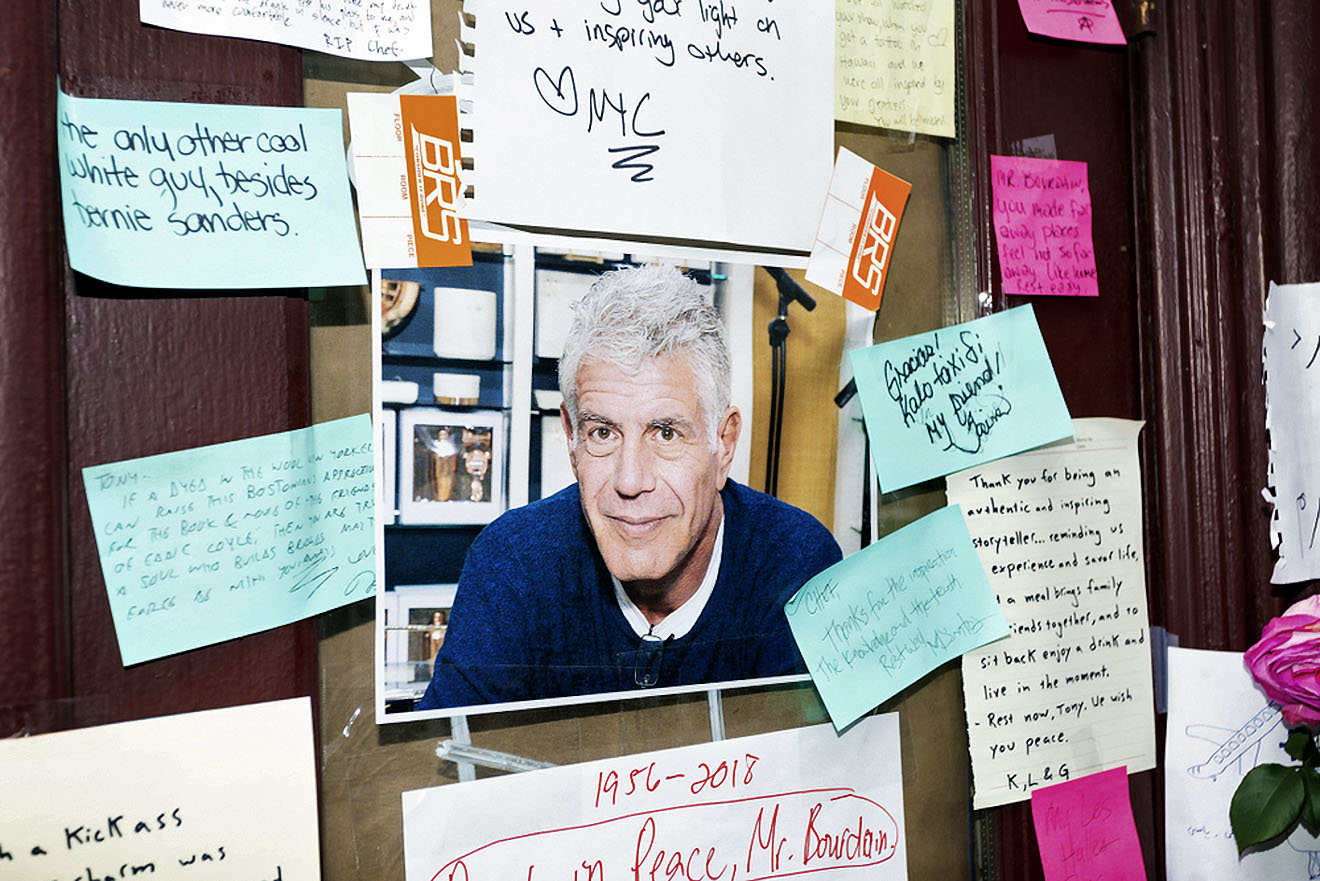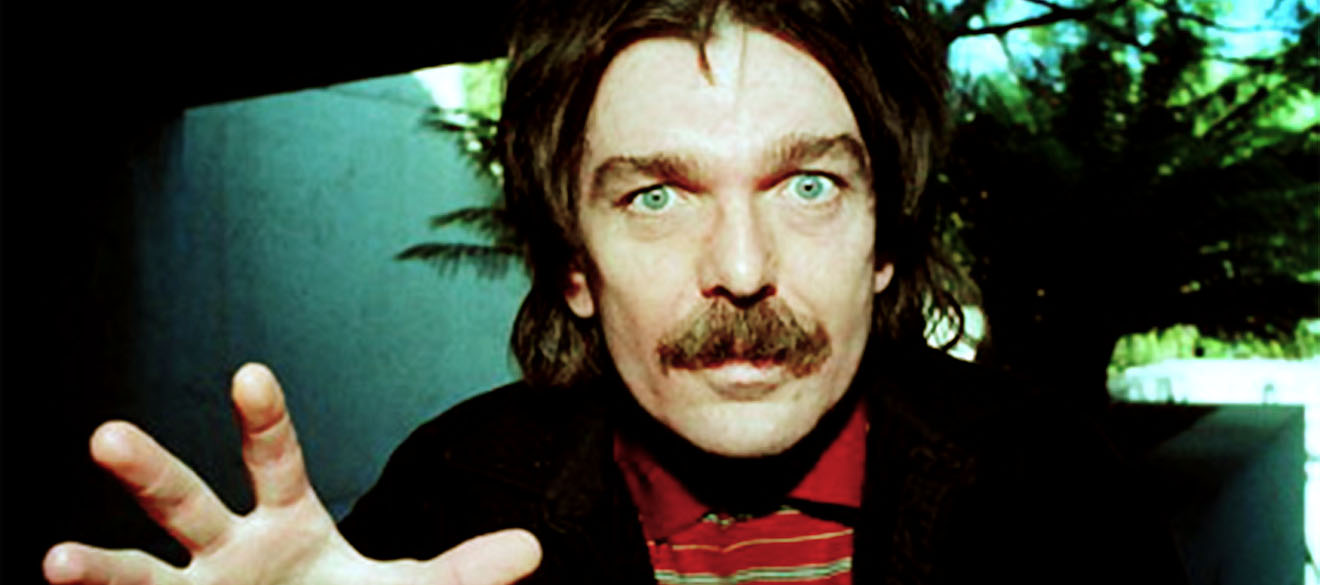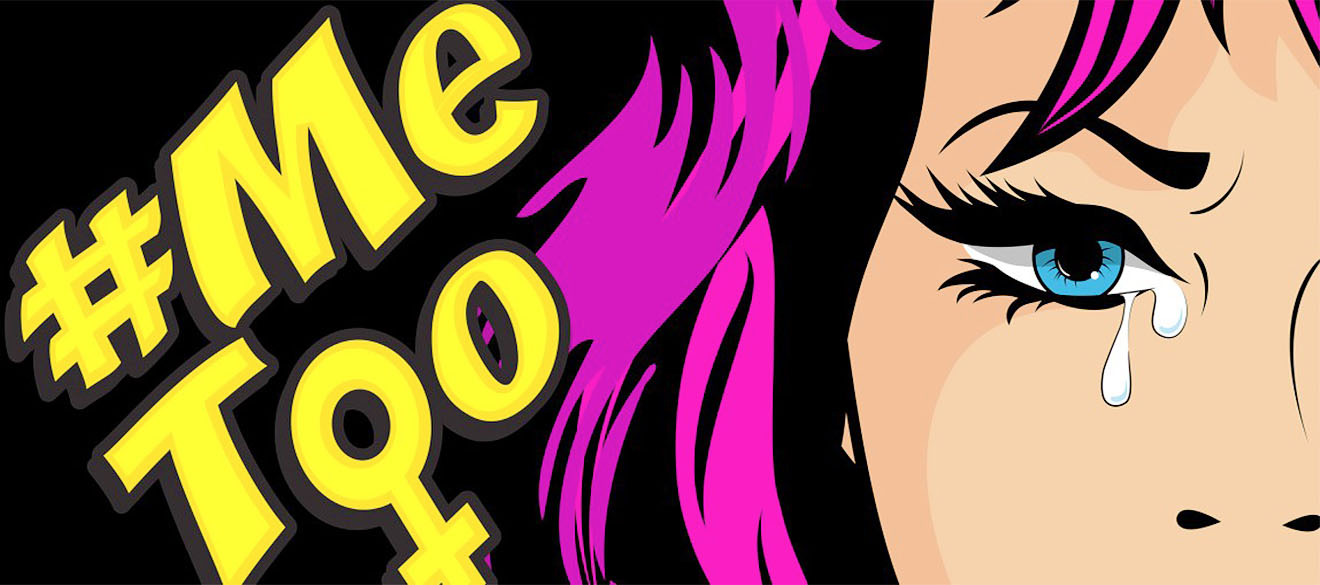Leigh should be done by now, she thought.
She tried calling. No answer. So she contacted Rico Strong, Raven’s male costar.
“We good,” Strong texted when Hearts asked if all was well with Raven and the shoot. “Bring ya black daddy [some] gummie bears please and ya smile.”
He always has his cup, Hearts thought. She had worked and socialized with Strong before, and knew he had a habit of dropping gummie candy into his vodka. Hearts finished her panel, picked up the chewy candy, and drove to the industrial porn studio.
Some 20 minutes later, Raven and Strong emerged together from behind a barred door. As Hearts passed him the bag of gummies, Raven got into the small red car and sat silently. Hearts chatted with Strong for a couple minutes, the actor happy to be done with a six-hour shoot, and looking forward to decompressing with his candied vodka.
After they said goodbye, the two women drove off into the night. Raven was oddly quiet. “What’s wrong?” Hearts asked as they drove down the 101 Freeway.
Raven, head shorn, heavily tattooed, burst into tears. “Oh, my God, what just happened?” she cried out, according to Hearts. Then she grew hysterical.
Strong, she said, had abused her on set.
Raven and Hearts had always liked Rico Strong. A 14-year veteran of the porn business, he had earned a reputation for professionalism and a sense of humor. He began shooting porn at age 18 to support his mother and grandmother, and within a few months he was pulling in $100,000 a year, he says. Over time, Strong became one of the most prominent African-American male porn stars of the Bush era. He calls himself a legend.
“People don’t even recognize you in porn unless you work with Rico,” he tells me in a phone interview. Without appearing alongside Strong, he suggests, “You’re not a girl who can say she’s a star doing interracial.”
But it’s no longer the mid-2000s. Like most porn stars, Strong’s pay has declined (slightly, he says) thanks to the popularity of free tube sites. Moreover, in 2016 Strong suffered what he calls a “dick injury” — the erectile-dysfunction drug Caverject had given him priapism, his painful erection lasting 19 hours. In an emergency procedure, a doctor administered anesthesia and drained blood from Strong’s penis with needles. A leading urologist, Dr. Tobias Kohler, likens the condition to “a heart attack of the penis.” It could have ended Strong’s porn career, but he recovered slowly and returned to work.
Earlier this year, Strong starred in an interracial gangbang alongside Hearts. Studios typically pay white women more to have sex with black men on camera. One performer said she received $2,500 for her first interracial scene — $1,500 more than her typical rate. Hearts showed up on set with Raven, Strong tells me. Noticing the carefully orchestrated design of tattoos covering nearly her entire body, Strong told Raven he loved the ink.
“I really, really, really liked [Raven’s body art],” he reiterates in our interview. “These bitches are cool. They are hella cool. I love the relationship they have with each other. They are pretty — different pretty! They are unique.”
On set at the gangbang, Strong and Hearts exchanged numbers and stayed in touch. Strong recalls Hearts sending him funny Snapchat clips and photos she took. “Nikki does great fucking photography work. She takes dope-ass pictures,” Strong says.
“You’re my girls,” he liked to tell the women, according to Raven and Hearts. “You’re my buddies.”
The weekend after Valentine’s Day, Hearts invited Strong to the Roosevelt Hotel. Located on Hollywood Boulevard, the place is a classic high-low Los Angeles staple: Marilyn Monroe used to live there, Lindsay Lohan used to drink there, and outside on the sidewalk homeless men sprawl while Johnny Depp impersonators duel for tourists’ attention.
Hearts and Raven were at the Roosevelt socializing with porn industry friends. Having planned a staycation that weekend, they’d gotten a suite. After arriving, Strong hung out with the couple, partying, laughing, enjoying their company. A few weeks later, while the couple was shopping for a new leather couch, Raven got a text from Strong. A female scene partner had bailed, and he wondered if Raven could replace her.
Strong, Raven says, described the scene as “kinda rough” with “light racial play” — a description she didn’t believe evoked the intense physical interactions expected of BDSM scenes, like those she’d shot for Kink and other companies. Strong said he didn’t know what production entity was paying for or distributing the film. Regardless, Raven says she texted back, “All right, I’ll rush my ass there.” After all, Strong was a buddy.

When Raven arrived at the address, she found a studio that looked like an auto shop. As she entered, she recalled seeing a warren of rooms, with one space a prison set, another containing piles of broken furniture, a third apparently a crash pad for an elderly man.
It was, Raven recalls, “a junkyard for porn.”
The studio’s owner was director Just Dave, a scruffy, tattooed industry veteran whose Twitter bio reads, “I shoot super hardcore the way it’s supposed to be shot!”
He introduced himself to Raven. She says the space and the fact that Dave would be shooting the scene made her nervous. When Hearts worked on Dave’s crew, she recalled Dave telling her, “I’ve been around dykes before. Dykes are mean. I better be nice to you.”
The shoot began with Dave asking Strong and Raven for their list of do’s and don’ts, which is standard practice before filming. This boundaries discussion appears early in the behind-the-scenes footage Dave later released to the media. During these minutes, Raven does not appear visibly nervous. Seated beside Strong on a white couch in the white studio space, she smiles, her manner casual. “You like rough sex in your personal life?” Dave asked, by way of introducing the scene.
“I do,” Raven replied, munching a green apple.
“Do you think it’s safe to say this guy isn’t breaking you?”
Raven giggled and looked at Strong. “I think we’re going to be okay.”
“I don’t think I’m gonna break her!” Strong joked.
In between more bantering, Dave told Raven, “If there’s anything we discuss and you do not like when we’re doing it, you can always say something. I cut anytime I hear stop, cut, and no.”
Raven agreed to a menu of slapping, including “butt smacks,” “boob smacks,” and “face smacks.” Dave asked if she was okay “throwing up” apples. Brandishing the green fruit, Raven replied, “Woo hoo!” Dave then asked, “Is there anything you absolutely don’t like?” After a brief pause, Raven looked Strong’s way. ”When we get to the sex,” she told him, “I have a pretty shallow cervix, so if you’re going to be slamming in there, it’s not gonna feel so good. You can still fuck me rough, but be a little more cautious.”
“We’ll make sure you are lubed up,” Dave replied.
When this discussion was over, Dave instructed Raven to put on a blue tank top bearing a picture of a cartoon donkey, symbolizing the Democratic party. The scene began with Raven on her knees while Strong stood over her, quizzing her about the party’s history of racism. In response to her answers, he would slap her. The first slap happens roughly half an hour into the behind-the-scenes (BTS) footage, a crisp strike that makes Raven laugh in surprise.
“It wasn’t a fake slap,” she stated in a YouTube video Hearts shot three days later capturing Raven’s account. “It wasn’t a slap that we typically use in porn to make things look a little bit more intense than they actually are. It was very painful, and it definitely stunned me. I, you know, saw stars, so to speak.”
In a precisely written, 3,600-word joint statement from Dave and Strong published by Adult Video News on April 12, Raven’s reaction to the slap is characterized as a “long hearty laugh,” implying that the contact couldn’t have been that hard. There’s another crisp, sudden smack roughly an hour into the BTS footage, causing Raven to go, “Oh!”
Insisting that he only delivered stage slaps, Strong denies that he hurt or ever would hurt Raven. “I would never hit a girl,” he tells me. “I’m 225 pounds. If I hit a dude, I’m gonna break your face, bro. I know how to hit a girl and make it look good. She has to go home and see her family. I’m not gonna do that shit.”
The veteran performer, whose scripted dialogue with Raven during the smacks, fellatio, and intercourse plays up their racial difference, goes on to reference one of the main characters, a cruel slaveholder, in a Quentin Tarantino movie.
“I love Django Unchained,” Strong says. “Leonardo DiCaprio is not a racist, but he said ‘nigger’ fucking 400 times in that movie. That doesn’t make him a racist in real life. He’s playing a character for his money in that movie. It’s the same thing I am doing on the set for that movie. It’s a character for this genre of porn that these fans like.”
The face slaps gave way to an aggressive deep-throat scene, with the two performers taking various positions on and beside the couch. The act’s length and physicality challenge Raven, who gasps for air at points, but she stays at it. The script called for her to go beyond gagging and actually regurgitate apple chunks as she fought to keep Strong’s erect penis down her throat. She recalls her costar saying at one point, “I hate doing these. I’ve done, like, 40 of these [scenes]. It sucks, man.”
In her YouTube account, Raven characterized the deep-throating as “a very, very, very rough blowjob where if I pulled back I got punished, so to speak.” Elaborating, she stated, “Rico was then sticking his dick in my mouth as far as he could while I was giving him, you know, leg squeezes, leg nudges, to ease up, but he wasn’t easing up… It was becoming unbearable at this point, because I had big, giant pieces of apple coming up the sides of my throat where, essentially, I’m choking.”
Claiming she was given additional apples so Dave could get the regurgitation footage he needed, Raven went on to describe herself during these mid-shoot minutes: “[I was] covered in saliva, snot. I’m sitting on the edge of the couch, not really saying much, wanting this to really be over.”
In their April statement, Dave and Strong emphasized that Raven showed no concern in the pre-shoot discussion when Dave mentioned the “throat-fucking” requirement. And they pointed out that she even referenced a “blowbang” scene she shot in January where she hung upside for 45 minutes while being deep-throated by multiple performers. “I popped all blood vessels in my face,” Raven tweeted after that shoot, “but it was all so worth it.”
Continuing to defend every element of the shoot, the statement noted that Raven never called for the scene to stop. It added, “No one who’s ever watched rough sex scenes would consider the March 6 scene among the roughest scenes out there. Not even close.”
After the grueling deep-throat session, Raven had sex with Strong in what she says was a sharply painful reverse-cowgirl position. In the BTS footage, which records two hours and 45 minutes of the six-hour shoot, there are moments when Raven whimpers; at one point she briefly wails.
“I was being penetrated extremely, extremely deep,” Raven said in the YouTube video. “I was squeezing [Strong’s] leg, his left thigh, I think, as hard as I could, while pushing away and wincing in pain and tears coming down my face, and he would smack my hand away, say some sort of ‘dumb white bitch’ comment.”
During the sex, her legs began shaking uncontrollably, a moment she mentions in the video. Raven says the position’s duress and the difficult penetration was not acknowledged by the men. She also claims Strong put his hands around her throat as they had sex near the end of the shoot, and again she saw stars, her vision briefly going black.
As to why she didn’t protest, didn’t ask Strong to stop, didn’t ask Dave to cut, and didn’t get up and leave, Raven says she was scared.
“I didn’t know what could happen to me. I was in a warehouse, it was nighttime, there were multiple men on set, it was just me,” she stated in the video. Raven says she did not expect the shoot to get this rough, and once it did, she told herself just to endure it.
The Adult Video News article publishing the April 12 statement also included Raven’s written rebuttal. She said the reason she didn’t end her participation in the scene was because her “defense mechanisms” had kicked in. Even that surprised laugh when the first face smack arrived was a way of coping, she suggested. “Things only got worse” from there, she continued in her statement, “and I did my best to dissociate and get through it. I remained in a state of protection mode for the remainder of my time on set.”
The shoot concluded with Dave filming a standard “exit video.” On most porn sets, directors record these interviews, asking performers if they consented to the activities captured. Wrapped in a pastel knit sweater, Raven answers questions asked by a production assistant. During its 2:27 length, she’s not visibly upset. She smiles, briefly laughs.
Asked to sum up the shoot, Raven says, “It was something new, for sure, but… it was good.” The assistant points out that she never asked Dave to pause a scene and he seems impressed by her stamina, saying it’s not typical for shoots like these.
Then he asks, “Was [Strong] attentive of your do’s and don’ts?”
“Yes,” Raven responds.
“Did you feel safe during the shoot?”
“Yes.”
“Did you feel respected by staff?”
“Everybody was really nice and attentive,” Raven answers.
“Would you ever shoot with us again?”
“Yeah.”
Later, with Strong sitting beside Raven in the frame, she is asked, “And you weren’t raped?” No, she says. Not long after that she was handed her $1,000 check and left.

Three days later, Hearts posted the YouTube video with Raven sharing her account of the night. Wearing a navy hoodie and large-framed eyeglasses, gazing straight ahead, she discusses the shoot in detail for roughly 40 minutes.
“Why did I agree to everything in the exit interview?” she asks aloud, when I meet the performer in June. “How could I believe it was safe to say how I really felt about that scene? In what world would that have gone over well? I was alone, surrounded by men who had just crossed my boundaries. They were all 50 pounds heavier than me.” She says some of their conversation during breaks did nothing to ease her mind. “Bottom line,” Raven continues, “I was willing to say anything to get out of that warehouse safely.”
When Raven and Hearts got home that night, they laid in bed with their puggle and two cats, trying to process what happened. They were friends with Strong, they were unsure who had paid for the video, and Dave had claimed to have shot many such scenes. Raven says the director indicated he was scheduled to film a similar scene the next day, and she felt concerned about what the female performer might face.
As for Hearts, she recalls struggling to make sense of it all.
“I really liked Rico and I like a lot of his friends,” Hearts tells me in June. “I was super betrayed and confused, but I don’t even think [Strong] knows he did something wrong. I felt so strongly that Dave allowed it and pressured it to happen. Rico was doing it for money.”
“And I was taking it for the money,” Raven says.
Turning to friends for support, Raven texted porn star Riley Nixon, sharing in broad, unsettling strokes what she said she’d been through. Before Raven even mentioned her costar, Nixon says she texted back, “Was this Just Dave’s set?”
In January, Nixon herself had received an invite from Strong to shoot a video with “light racial play.” To her, “light” meant Strong might say something like, “Little white girl, you like that big black dick?” She found it strange that he did not know the name of the production company, but her rent was coming, and she was broke. She agreed to the shoot.
At the set, Dave asked Nixon to put on a shirt that said “Feminist.” During the scene, Strong asked her questions about feminism and smacked her face as she answered.
“I like getting slapped in the face when it’s done properly,” Nixon tells me. “It’s great, but it’s not done to cause extreme injury. You have to learn to do it properly. Rico does not know.”
When the scene finally wrapped, Nixon stood up. Vomit, she recalls, drizzled down her body. She went to the bathroom and discovered a filthy floor. This was a time when ringworm had been traveling through the porn community, so Nixon grabbed an old washcloth and dropped it on the shower floor to stand on. Thinking she should document the conditions, she snapped a few photos, stepped into the shower, and tried to get clean in the dirty stall, which offered dishwashing liquid rather than body wash.
When direct-messaged about this account, Dave neither denied nor disputed Nixon’s description of the shower. As for Strong’s take on studio conditions, he says, “Some things aren’t the best. But I felt okay.”
Nixon sees one key difference between her experience and what Raven recounts. Soon after leaving the studio on that March night, Raven began to feel she had been victimized. A line had been crossed, she believed, and the word “rape” entered her mind.
“I would never do anything in this world to hurt a woman, let alone a woman in my career,” Strong said. “It has to do with racism. She knew the attention she’d get if she put it on a black man.”
Nixon does not characterize her own experience this way. “I am not trying to throw them in jail,” she says. “I consented.… [Rico and Dave] need to learn or get a new job.”
Unsure of what to do with what Raven had told her, Hearts reached out to legendary porn star Buck Angel.
“What? What?” Angel responded when Hearts described what Raven allegedly experienced. As a 46-year-old trans man, Angel has long advised younger performers, even calling himself their “tranpa.” He suggested Raven should go public with her account.
“It needs to be spoken about,” Angel tells me in an interview. “The more this happens in our industry, and the rest of the world sees this, we are [going to be viewed] as perverts [who] rape women. This is a male-managed industry, and there is a huge disrespect for women.” He pauses. “Even though I’m a transsexual man, I’m still a man, and I’m treated so much better than women in this industry.”
It would not have been the first time a porn star made allegations of abuse. Linda Lovelace, star of the 1972 movie Deep Throat, accused her manager of rape in her notorious 1980 memoir Ordeal. Jenna Jameson detailed a lifetime of sexual abuse at the hands of various men in her autobiography How to Make Love Like a Porn Star: A Cautionary Tale. Retired porn star Shelley Lubben is one of several ex-performers who has alleged being raped by costars. In 2015, Stoya and other porn stars took to social media to accuse male performer James Deen of sexual abuse (he denied all accusations).
All of these accounts and allegations became cautionary tales for young women entering porn. But Raven and Hearts were hoping that a lengthy, detailed video account, recorded fresh after the alleged incident, would not only act as an immediate industry alert but might also help bring about some actual change in gender relations on porn sets.
In this way, it could be another chapter in the #MeToo movement.
Raven spoke to Riley Nixon, explained her goals in going public, and the women agreed to film a YouTube video at a friend’s house in the Hollywood Hills.
The March 9 video quickly went viral.
In response to the allegations, Rico Strong stated that he believed Hearts was in love with him and had set up Raven to falsely accuse him because she was angry that her wife was having sex with him on camera. “I would never do anything in this world to hurt a woman, let alone a woman in my career,” Strong said. “It has to do with racism. She knew the attention she’d get if she put it on a black man.”
“If Nikki was racist,” Buck Angel tells me in response to Strong’s conjecture, “she would not have shot [that gangbang film] with him in the first place.”
Just Dave reacted by releasing the behind-the-scenes footage, which offers a wide shot of the set from a fixed position, with Raven’s facial expressions not always visible. He sent the footage to longtime sex-industry reporter Tracy Clark-Flory, who had written about the YouTube accusations for Jezebel. Her April 14 story highlighted the fact that Dave and Strong made transphobic jokes on set, which prompted additional controversy.
“They didn’t even fucking realize it [came off bad],” Hearts says of the trans jokes.

Given Dave’s willingness to circulate the BTS footage, no one was surprised that the tape contained no smoking-gun evidence in support of Raven’s account. As Clark-Flory wrote, “Her key allegations — that she was uncomfortable with the nature of the shoot, guided into a particular sexual position she had voiced concern about, pressured into eating apples to vomit on camera, penetrated deeply enough to cause pain, and scared of voicing her discomfort on set — cannot be ascertained from the video footage. Raven is shown laughing at several points in-between takes and also being quiet and looking tense.”
The footage is available for anyone to access at several online venues, including AVN.com. Viewers can make up their own minds about how to interpret the rough-sex scenes and Raven’s vocalizations, as well as her demeanor before and after the marathon session. But to Just Dave, this footage is case closed. When I direct-message him on Twitter, he writes, “The truth is irrelevant! Why let the truth get in the way of a good narrative? This girl made everything up! Everyone who has watched the BTS video knows it! But everyone is afraid of the backlash for defending me. I definitely have a shit ton of DM’s from everyone telling me what a raw deal I got. But hey: That’s life.”
Declining an interview, Dave directed me to his April 12 joint statement. It’s a careful text, with a point-by-point rebuttal of Raven’s claims. Flatly denying “every accusation or implication of assault, sexual assault, deception, bullying, and consent violations” made in the YouTube video, it insists Raven was fully briefed on the shoot’s requirements. It mentions Dave’s 15 years shooting porn. It ends by warning of the dangers of “one-sided Twitter trials.” Addressing all porn directors and producers, the statement argues that without better protocols for handling allegations, a false claim could destroy a career.
In Raven’s same-day response posted on AVN.com, she contended that the face smacks were “flat-out violent.” She wrote, “I do a ton of rough scenes. Probably some of the roughest in the business as a matter of fact. I am able to do this because of the fact that am not taken by surprise at any moment [and] the environment is controlled.”
When she films “extreme BDSM scenes,” Raven continued, those on set “know how to look for true pain or discomfort.” Here, she said, “there were plenty of times I visibly cried, and pushed away at Rico, hoping that at some point Dave or [the assistant] would recognize my pain and cut.” She reminds people that the BTS footage captured less than half the shoot. And she explained that her reason for going public was to “get the word out to other women who might be put in the same situation, as quickly as possible.”
As the YouTube video continued to circulate, Raven and Hearts spent tense evenings at home beside their beloved pets. Death threats began hitting their inboxes. Though some female porn performers publicly defended them, others attacked them on Twitter.
“Wow!” Buck Angel reacted when I asked about other actresses taking shots at the couple. “What does this say about this situation to me? It says women are fearful to lose their jobs, so they don’t want to speak out.”
During this period, the phone rang. Hearts hesitated, then answered. It was Ian O’Brien, Senior Director of Programs and Operations at an adult-industry advocacy group called the Free Speech Coalition.
“We need help,” Hearts told O’Brien, saying she and Raven feared for their physical safety. O’Brien drove to their house with a box of pizza. Sitting down opposite a stripper pole and an oversize Chucky doll, he listened as the couple told their side of the story. He ended up booking them a hotel room and drove their pets to a 24/7 animal daycare.
Safe in the hotel, Raven and Hearts continued to encounter online attacks from female performers, members of the roughly 2,000-strong Valley porn community.
“Everyone says porn is one family, because we all make our migration to [the Adult Video News Awards in Vegas] once a year, and we’re all [transplants], but we’re all one big, literally incestual family,” Hearts tells me. For a long time, the house the couple shared had been an unofficial shelter for distraught girls in the porn industry. These were young women who came to Los Angeles, ran into trouble (abusive boyfriends, drugs, money problems), and ended up crashing for a time in the safe space of this house.
“Now we are here alone,” Hearts laments. “We don’t have a lot of support.”
In the days following the March 6 shoot, Raven attempted to achieve more than social media justice. She believes directors are responsible for their workplace, not performers. She says, “[Dave’s] just as much, or more, at fault.” Troubled by the thought of other women working on his set, she called the Division of Occupational Safety and Health (Cal/OSHA) for help. She wanted to report an unsafe workplace environment.
“Get there this day, this time, and you’re going to find fucked-up shit,” Raven recalls telling an official at the government agency. To her knowledge, the agency never investigated. (Cal/OSHA is not at liberty to discuss specific complaints, they told me.)
“OSHA does not care about porn,” Buck Angel observes. “They don’t think it’s a legitimate career. I’m in the cannabis business now — it’s exactly the same as the early porn business: the way people react to you, these stigmas.”
More consequentially, Raven also went to the Devonshire Police Department, an LAPD precinct in Northridge, and filed a police report. She underwent a SART exam, which she says discovered cervix bruising and a vaginal tear. Later she was interviewed by a female detective. The session did not go the way Raven expected it would.
“Don’t bullshit me, don’t lie to me,” she recalls the investigator saying as they sat alone in a room and went over her account. (The department did not return two voicemails requesting comment.)
“I have no reason to lie,” Raven responded. “I’m flustered.”
“I already watched the video,” the detective said, according to Raven. “Just Dave brought it over.”
“Then why did I have to explain all that?”
“That was not how it all happened,” the detective stated.
“Everyone says porn is one family, because we all make our migration to [the AVN awards]… but we’re all one big… incestual family.”
Raven asked her if she had watched the entirety of the behind-the-scenes footage.
“I didn’t watch it all,” the investigator answered, according to Raven. “Since you didn’t say ‘no’ and you didn’t say ‘stop’, what can I see that shows you were in discomfort?”
“I was crying. I was saying ‘ow’.”
“There’s no law against crying in porn.”
When Raven came home, she wept to Hearts about her exchange with the female detective. The police department ultimately chose to drop the case.
“[The cops] were just as offensive as the incident,” Hearts says.
The debate around the Raven/Nixon video has emerged at a pivotal time for porn. In 2013, the Obama administration marked porn companies as “high risk,” encouraging banks to stop taking adult performers’ money. Throughout the Obama era, California politicians attempted to pass laws mandating performers use condoms. (It did not cross their minds that this would simply just push porn further underground.)
Under the Trump administration, the sex-worker witch hunt has arguably worsened. President Trump signed FOSTA (the Fight Online Sex Trafficking Act), a bill that also prevents sex workers from advertising online, and senators Elizabeth Warren and Marco Rubio are currently collaborating on new legislation that would expand the previous administration’s war on sex workers’ bank accounts. Meanwhile, Tennessee congresswoman Diane Black is insisting that porn causes school shootings.
“It was bad under Obama and it has gotten worse,” says Buck Angel. “It has gone back to this puritanical everyone-is-on-drugs view.”
Media stories about on-set abuse do nothing to help the industry’s reputation. The accusations leveled against James Deen in 2015 were widely publicized. A year later, porn star Nikki Benz alleged that she was subjected to physical abuse on a set with director-performer Tony T and performer Ramon Nomar. She’s suing them for sexual assault; they’re suing her for defamation.
It has been difficult for the porn industry to prevent worker abuse. According to O’Brien, the Free Speech Coalition lacks formal policies and protocols for allegations of abuse. Production companies did not band together to form the coalition to fight rape; they aimed to fight censorship laws, while providing a code of ethics.
As MindGeek, PornHub’s parent company, increases its reach and porn stars jump to more indie work, the Free Speech Coalition has been forced to retool its mission.
“The realm of governing in the industry — especially something as complicated as these claims — is something we have to figure out,” O’Brien says.
But the Free Speech Coalition only has so much control.
“The Free Speech Coalition is voluntary,” O’Brien explains. “A lot of it is based off of trust. The decentralized nature of production makes it difficult to regulate. We can’t just have a conversation with a company and say, ‘Fix your policy.’ They may have hired an outside contractor. We may or may not know them.”
In other industries, workers would turn to the government to push for regulation, but porn workers don’t have faith in this as an option. To their eyes, the government either targets them or ignores them.
“How do you talk about assault or violence in an industry that has had so many false presumptions about it without triggering biases,” O’Brien remarks.
In July 2016, several porn performers established the Adult Performers Actors Guild (APAG) to address concerns of workplace abuse. APAG has encouraged performers to avoid taking to Twitter or Instagram for justice.
“It’s the day of social media,” says union president Alana Evans. “When we are upset, we like to go public.” But Evans believes airing workplace grievances online prompts production companies to go on offense and avoid cooperating. To avoid a kangaroo court, APAG instructs women to file a union report and then allow the group to investigate.
APAG has fought against directors shooting exit videos, encouraging them to pay before the end of a shoot, and advising performers to say “no” upfront or in the moment to any activity they don’t want to participate in. “Right then and there is where we take away consent,” Evans says of exit videos. “You’re extorting her. She’s looking at either paying hundreds of dollars in kill fees or having sex and doing something she didn’t want to do, because you’ll make her pay. It is not a small amount of money.”
In April, the Supreme Court of California ruled that many workers previously considered contractors are now employees. APAG believes this will make it easier for the union to negotiate with producers and protect workers. Still, even with this change, some porn veterans remain pessimistic. “Unions in the adult-film industry are difficult for a number of reasons, the biggest being the blurred roles of performer-producers,” remarks Jizz Lee, a producer at Pink and White Productions. “There’s also not enough financial infrastructure — thanks, tube-site piracy.”
Lee and others see a more grassroots organization, the Adult Performer Advocacy Committee, as a possible solution. The group promotes a code of ethics, hosts performer mentorship programs and skill sharing, and offers other resources. After director Shine Louise Houston read their ethics guidelines, she stopped giving paychecks following exit videos and starting distributing the payments beforehand.
But not everyone in porn will self-regulate, Hearts points out.
“If you have shot any sex, you can be a porn director,” she notes. And she makes the point that no one can force a director or producer to follow ethical guidelines.
In other industries, workers would turn to the government to push for regulation, but porn workers don’t have faith in this as an option.
The March 6 BTS footage captured a professionally run set in terms of paperwork distributed and signed, the director proceeding through the boundaries and script discussions, the exit interviews and payments. But that doesn’t mean everything about the shoot was transparent. For example, Strong says he doesn’t know what company or entity was associated with it, or the one he shot with Dave and Riley Nixon earlier.
“I don’t know whose site it is. I’ve never met the owner — anything,” he tells me. “I know Just Dave is working for someone else. I’ve heard him call and say, ‘I want this. I want that. Here’s the script.’ He sends it in.”
As for these scripts, with their race-play dialogue, aggressive deep-throating, and regurgitation moments, Strong says he has toned some of them down prior to shooting. Elaborating, he states, “It was some of the racial play and some of the things they wanted me to say. I wasn’t comfortable saying it, with everything going on in the media. I don’t need to say that right now… I don’t want to go that deep into that character.”
He says he also weighed in concerning the regurgitation requirements. “I can’t handle throw-up,” he tells me, saying he suggested what the women should ingest. “Let the girls only drink water and eat apple slices. We bought apple slices from Whole Foods. When you chew that up, it’s just water.”
As you might imagine, the controversy surrounding the March 6 shoot has impacted the work lives of Strong and Just Dave. Their joint statement addressed this. “Just Dave’s shoots have ground to a standstill and Rico hasn’t worked in more than a month,” it pointed out, adding, “A leading talent agency’s response to the accusations was to ban both from ever working with its roster.”
The morning Strong and I talk, he says he woke up to a notice on his door saying the electric company was going to turn off his lights unless he paid his overdue bills.
“I have now not worked in 106 days,” he tells me. He still supports both his mother and grandmother, and says both women are now suffering from cancer. He paid their medical bills out of pocket, but now he has run out of money. And because of his years of work in the adult-film industry, he says it’s hard to find another job.
“I never even wanted to do porn,” he tells me. “I’m stressed out. I know I didn’t do anything. I know I would never put someone in an uncomfortable situation.” Looking back over his many movies, Strong says there were times when women declined to perform certain sexual acts, and he told directors, “Kill the scene. I’ll eat the [financial] bullet.”
“It fucked my life up,” he says of what happened. “My life is a disaster.”

Raven and Hearts have had their own struggles.
Arriving early at their house one day in June, I wait beside a doormat reading “Go Away.” The women arrive with McDonald’s hamburgers and weed. They welcome me into their tidy home, where I spot a row of Converse sneakers and see-through stripper heels. Raven wears a hoodie over her now fully shaved head, shuffling around in furry slippers. Hearts rocks purple pants, an Evil Angel sweater. The whole house smells of candles.
Sitting on their leather couch, they discuss porn-world rumors and conspiracy theories about Hearts. While I was reporting this story, a porn star told me she had heard that Burning Angel, a popular alternative production company, had fired Hearts for alleged Nazi ties. (A Burning Angel spokesperson dismissed the story as ridiculous.) To the surprise of Raven and Nixon, Hearts received most of the criticism.
“They have this conspiracy that Nikki put me up to this, because she is a jealous wife, and I had chemistry on set with Rico,” Raven says. “There have been performers that have completely turned on me. They said I made this up to get fame and notoriety. Please tell me where the money is coming from.”
In fact, producers and directors have stopped calling. Raven estimates she has lost 90 percent of her work, with only Penthouse and Evil Angel booking her as of press time. Hearts previously worked behind or in front of the camera three to five days a week, but all her porn work has vanished. Still, she insists she is fine with being excommunicated.
“I’ve exited porn,” Hearts says. “I can’t work with these people, with this kind of shit.”
Although Riley Nixon has booked scenes with Kink and a few other producers, she hasn’t worked much either. Raven, Hearts, Nixon, and Strong have all ended up in a similar situation: exiled from the San Fernando Valley’s most notorious industry.
Raven and Hearts admit empathizing with Strong. “He was doing his job to get his paycheck,” says Raven. Still, as that March night comes back, she adds, “But at the same time, anybody with any morals or basic understanding of morals would have backed off.”
Hearts tells me she used to be idealistic about the porn industry, believing it could help American sexual attitudes broaden and evolve. Her view has changed.
“Porn is joked over and laughed at, like it’s not a real job,” she says. “I am seeing now why people think that. If you work at McDonald’s, you are treated better.”
When Raven and Hearts posted the YouTube video, they hoped to help women performers avoid what they viewed as a potentially dangerous situation. And they believed it could help lead to greater awareness of the way women are treated in porn. Instead, both the accusers and the accused have become characters in a story with tragic outlines. It’s a tale that seems part Rashomon, that classic Akira Kurosawa film about how different people can interpret the same event in contradictory ways, with truth elusive. And it’s a tale of what can go wrong when accusations go viral in an era where gender relations are so supercharged, and people so quickly pick sides. No one wins in this story.









